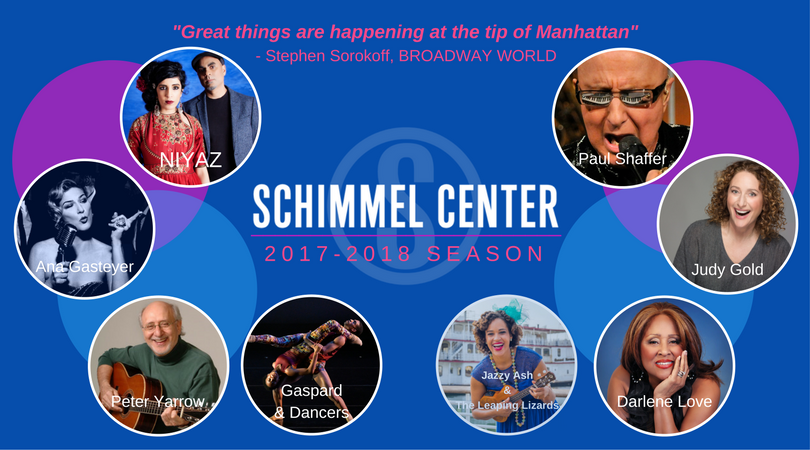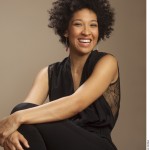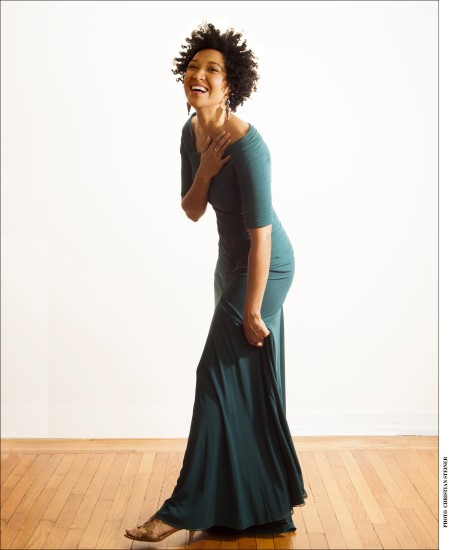Inside Look: An Interview with Julia Bullock
On Sunday, September 21, The schimmel center will simultaneously launch our 2014-15 season and kick off our “VOCE: Rising Opera Stars in Recital” series. Joining accompanist, Steven Blier will be soprano, Julia Bullock and Tenor, Paul Appleby as well as Baritone, Andrew Garland. I recently caught up with the stunning soprano, Julia Bullock to ask some questions about the program and her career.
MT: Can you describe your musical background growing up to me? How did this background lead you to your passion for classical music?
JB: Music was always playing in my house, but not much classical music other than Peter and the Wolf by Prokofiev. 🙂 But I’d say that my introduction to music came most through dance growing up. Starting age 4, I would go to my mother’s tap classes, and follow along in the corner, once I was old enough I took lessons myself. I’d come home and turn on cds ranging from broadway musicals, to jazz, to 70s rock, you name it, and physically immerse myself in the music. (I still do that!)
I’d say that my passion for classical music didn’t come until I was about 17, when my step father gave me recordings of Regine Crespin, some productions of Peter Sellars which featured Lorraine Hunt Lieberson, and the definitive performance of Kiri Tekanawa and Frederika von Stade in a production of Le nozze di Figaro. I thought, “Ok these women have got something tremendous resonating through them. Not in the same manner as Janis Joplin, Nina Simone or Billie Holiday, but it’s something deep, and I want to know how to do that.” My passion for classical music was certainly informed by those initial audio and visual recordings, turning them on REALLY loud, and physically immersing myself in the sound.
MT: The Voce at Pace series is exciting because it’s one of the rare opportunities for New York audiences to experience rising opera stars such as yourself in an intimate recital setting. Can you speak about the differences in performing a recital as opposed to playing a part in a fully produced opera?
JB: Music is music: a lot of the differences just depends on the scale of the piece. One thing I ADORE about recital work is that there are so many different styles, languages, modes of communicating that can be joined together in one evening. The intimacy is felt between the performers themselves, and the audience, and which then enhances everyones engagement with the material. Conversely, if not everyone in a team is onboard with a common focus for a production, opera can feel a bit stifling (which is ironic given the size of the theaters in which operas are often presented). But when you’re working with great creative personalities, it can be some of the most satisfying, intense, and intimate work. I could maaaaaybe stand by this statement: the musical phrases in opera are often longer, whereas the literary phrases in the poetry of art song are more often than not, longer and more complex… there, that’s one difference! 🙂
MT: What was the process for picking out the repertoire for this recital? Was it a collaboration between you and Mr. Blier?
JB: Yes, it was a collaboration, for sure. Steve Blier proposed a concert of French and American music, and I thought that GREAT! Steven proposed an initial program, and out of the 10 songs he suggested for me, I like 8 of them, and then we added a few. Steve, I trust. He sees me pretty clearly, and I think I see him as well. I’ve known him for 4 years, and there are songs he suggests that I take a look at that I’d just never consider on my own, but I usually love them, and want to use them again and again. (But I surprise him too… 😉
MT: Are you drawn to “Art Music”? Why showcase French and American “Art Music” in particular?
JB: Well, I can’t speak for anyone else on this program, but the first recording I fell in love with was Regine Crespin’s mélodie recording of Berlioz, Poulenc, Debussy, and Ravel. I don’t know if it was the material she sang, or how she sang it, but even now, after almost 10 years of studying classical voice, I can return to that recording and be immediately inspired. My mother took me to a lot of musicals when I was growing up, and I wanted to pursue musical theater for a long time, so that’s one piece of the American song literature that I loved, partially because I could relate to it immediately, there was no room for posturing. But a coach Scott Schoonover, that I met in the Artists-In-Training program with Opera Theatre of St. Louis, who currently runs his own opera company in St. Louis called Union Ave Opera, was the first person who helped me understand the close relationship between text and music, and those hours and conversations with him have remained with me to this day – and we worked a lot on American art song. A lot of the poetry in song literature is just mind-blowing. I’m encouraged to research the poetry, as much as the music itself. It’s a medium that demands all of my attention, which makes it super satisfying.
MT: How does the music in this recital program reflect on who you are as an artist right now?
JB: Musically, vocally, and mentally, it’s a demanding program. Even though we are only dealing with French and American song, there’s a wide range within that. It’s almost as if every composer draws out a different sort of vocalism, and right now, I’m excited by delving into those extremes without looking back.
MT: Do you have a favorite piece that you will be singing? Why is this your favorite?
JB: I always say that my favorite piece is the one I’m singing in that moment, and to a point I have to commit to that statement. However, one of the pieces that terrifies and excites me is Bernstein’s “A Julia de Burgos.” I didn’t know anything about this poet before Steve asked me to look at this song. Burgos was a fierce human being, but it’s almost as if the world couldn’t hold her for long. Her life story alone is tragic, but what she says in this poem, about being heard for who she was, and what she was, and where she wanted to go just shakes me to the core. So for the challenge of stepping into Julia de Burgos’s shoes, combined with the fiery setting that Bernstein gives her words, I’d say that piece is the one.
MT: You were recently the winner of the 2014 Naumburg International Vocal Competition. Is this a goal that you have had for a long time? What was the experience like for you?
JB: The pianist I work with regularly, Renate Rohlfing, suggested that we apply. The timing was a bit complicated because I was making my New York recital debut the same week, but Renate said, “You know, if we have to pull out, we just pull out.” And I thought, ok, if this is just about exploring repertoire, and presenting music to a panel of individuals whom I hold in the highest musical regard, then let’s give this a shot. I actually felt better about my musical offerings in each stage of the competition than I did for my recital, I think because I couldn’t anticipate anything (you have to offer two FULL recital programs in order to compete, so that’s approximately 45 songs); I just had to be poised and open to anything. Some of the American singers that have inspired me most, both vocally and in their life’s pursuit in music, have been amongst the winners (amongst them Dawn Upshaw, Shirley Verrett, Lucy Shelton). And Margot Garrett, who is Renate’s teacher and mentor, competed with Dawn the year she won, so in that respect it felt like we were living into a legacy of some sort. Naumburg is considered one of the most highly competitive and esteemed competitions in the country, so it was a great honor, not just to win, but to compete. This is not a competition about the voice, as much as it was about one’s ability to communicate.
Naumburg was a competition founded in the 1920s to help young, emerging performing artists with financial and professional support. Each year they select a different instrument to have compete, (either strings, woodwinds, solo piano, sometimes chamber groups) and in 2014 they were auditioning for voice – which they hadn’t done for 5 or 6 years. Some of the American singers that have inspired me most, both vocally and in their life’s pursuit in music, have been amongst the winners. Naumburg is considered one of the most highly competitive and esteemed competitions in the country, so it was a great honor, not just to win, but to compete.
MT: At such a young age, you have already accomplished so much. Where would you like to see your career in the next 10 years? Do you have any juicy dream roles?
JB: I don’t feel that young…. HA! Truthfully, I’m just on a quest to continue building my skill set – the work is never done. Choosing to live my life with music at its center feels all encompassing, but there are almost innumerable different and critical aspects to being a singer, so it keeps the investment and work exciting and varied. I’ve been fortunate enough to collaborate with teachers, coaches, directors, conductors, and musicians that continually push me forward in my development: physically, mentally, emotionally, and on and on and on. I feel that I’ll always be a student to some degree, even though I can finally acknowledge that I now have a lot of tools at my disposal to aid me along the way. For me, this is ultimately about exploration. When I look at the careers of my favorite singers, they always had a amazing presence, but out of those, the performances that move me the most came when whey were in their late 30s and 40s. So, when I take that into account, I’m amazed that I’ve been given so many opportunities to share.
Roles??? I’m just taking them as they come! 🙂
For more information on Julia Bullock, please visit www.juliabullocksoprano.com
See you at the Schimmel!
Schimmel Blogger, Michael Scott-Torbet
VOCE at Pace: Rising Opera Stars in Recital with Steven Blier, Julia Bullock, Paul Applby and Andrew Garland.
Performance
Sunday, September 21st at 3:00pmTicket Prices
$39



